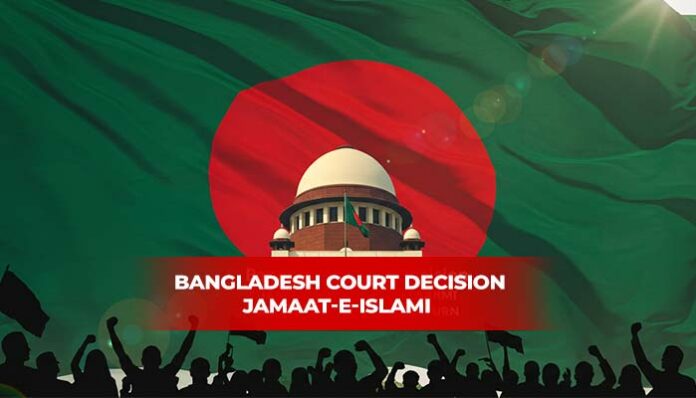On Sunday, Bangladesh Court Decision Jamaat-e-Islami a biggest Islamist party, regained its official registration. This decision allows the party to join upcoming elections after being banned for more than ten years under the previous government.
Jamaat-e-Islami’s registration cancellation was reversed by the Supreme Court, giving the party formal recognition once more by the Election Commission. This reversal is a key part of the recent Bangladesh Court Decision Jamaat-e-Islami.
According to Towhidul Islam, the Election Commission’s lawyer, the commission has been ordered to manage the registration process in line with legal requirements following the Bangladesh Court Decision Jamaat-e-Islami.
Jamaat-e-Islami’s lawyer, Shishir Monir, said the Bangladesh Court Decision Jamaat-e-Islami will help create a democratic and inclusive political environment. He emphasized that the ruling encourages the involvement of multiple parties in Bangladesh, a nation of around 170 million people, mostly Muslims.
Monir told reporters, “Our hope is that Bangladeshis from every community and faith will stand behind Jamaat, helping to create a parliament filled with constructive and spirited debates.” This hope was strengthened by the Bangladesh Court Decision Jamaat-e-Islami.
Background and Political Context
Following Sheikh Hasina’s exit from the prime minister’s office in August, the party sought a review of the 2013 court decision that had prohibited its activities.
On Sunday, a significant decision was made following the Supreme Court’s earlier ruling on May 27. On that day, the court overturned the conviction of A.T.M. Azharul Islam, a senior leader of Jamaat-e-Islami.
Azharul Islam had been sentenced to death back in 2014. The charges against him were very serious, including rape, murder, and genocide, all related to events that took place during Bangladesh’s war for independence from Pakistan in 1971. This war was a defining moment in the country’s history, leading to the creation of Bangladesh as a separate nation.
Back in 1971, Jamaat-e-Islami took the side of Islamabad during the war, a fact that still causes strong feelings in Bangladesh today.
The party opposed Sheikh Mujibur Rahman, the father of Sheikh Hasina and the key figure behind the founding of Bangladesh’s Awami League.
While in power, Hasina banned Jamaat-e-Islami and launched a tough crackdown on its top leaders.
Then, in May, the interim government in Bangladesh put a hold on the Awami League’s activities as it awaited the verdict in a case related to the party’s harsh response to widespread protests that ultimately forced Hasina out last year.
For authentic news and the latest updates, stay connected with: DumdaarPoint.com

